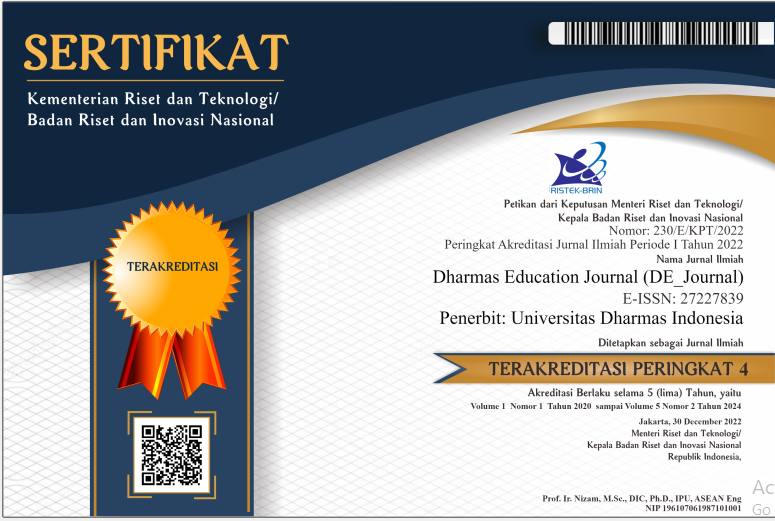Google Classroom based project learning on Science Literacy
DOI:
https://doi.org/10.56667/dejournal.v6i1.1327Kata Kunci:
Google Classroom,Project based learning, Scientific Literacy.Abstrak
During this COVID-19 period, all activities, especially education, are carried out at home. Using online learning media, such as Google Classroom, has led to online learning (in the network). This study aims to generate and determine the effectiveness of online learning using Google Classroom based on project-based learning on scientific literacy. This research method uses the type of research and development with the ADDIE development model. The stages in the ADDIE model consist of 5 stages, namely the analysis, design, development, implementation, and evaluation stages. Data collection techniques used are test and non-test. The subjects in this study were elementary school students. From the research results obtained from the validation results of learning materials and media, the results of the assessment of Google Clasroom learning media based on project learning on scientific literacy obtained a percentage of 95% with the category "Very Valid" and the results of the validation of learning media obtained a percentage of 92%. So based on these results, this Google Clasroom based on project learning media product is suitable for use during the learning process at school.The result of the development of this learning media is a project-based learning media based on Google Classroom. It can be concluded that Google Classroom learning media based on project-based learning is suitable for use in online learning and improving students' scientific literacy.
Unduhan
Referensi
Abdalla, A., Aljheme, E. & Abdulhadi, F. (2021). Effectiveness of Using Google Classroom as a Blended Learning with the Libyan EFL Learners at Sebha University. International Journal of English Language & Translation Studies. 9(2). 31-37.
Abid Azhar, K., & Iqbal, N. (2018). Effectiveness of Google Classroom: Teachers’ Perceptions. Prizren Social Science Journal, 2(2), 52–66.
Bondarenko, O. V, & Mantulenko, S. V. (n.d.). Google Classroom as a Tool of Support of Blended Learning for Geography Students, 1–10.
Divariyani, F., & Slameto, S. (2022). The Relation of Google Classroom Usage on Student’s Learning Outcomes for Elementary School Students. Jurnal Ilmiah Sekolah Dasar, 6(2), 338–345. https://doi.org/10.23887/jisd.v6i2.45127.
Fitri Rahmawati, B., Zidni, & Suhupawati. (2020). Learning by Google Classroom in Students’ Perception. Journal of Physics: Conference Series, 1539(1). https://doi.org/10.1088/1742-6596/1539/1/012048.
Gikas, J., & Grant, M. M. (2013). Mobile computing devices in higher education: Student perspectives on learning with cellphones, smartphones & social media. The Internet and Higher Education, 19, 18–26. https://doi.org/https://doi.org/10.1016/j.iheduc.2013.06.002.
Kassim, W. Z. W. (2021). Google Classroom: Malaysian University Students’ Attitudes towards Its Use as Learning Management System. Proceedings of the First International Conference on Science, Technology, Engineering and Industrial Revolution (ICSTEIR 2020), 536(Icsteir 2020), 438–446. https://doi.org/10.2991/assehr.k.210312.072
Kelana, J. B., Wulandari, M. A., & Wardani, D. S. (2021). Penggunaan Aplikasi Zoom Meeting Di Masa Pandemi Covid-19. Jurnal Elementary, 4(1), 18–22.
Naila, I., & Khasna, F. T. (2021). Pengaruh Pembelajaran Daring Terhadap Kemampuan Literasi Sains Calon Guru Sekolah Dasar: Sebuah Studi Pendahuluan. … Dasar: Jurnal Kajian Pendidikan dan Hasil …, 7(1), 42–47. Diambil dari https://journal.unesa.ac.id/index.php/PD/article/view/12177.
Paristiowati, M., U, D. I., & K, N. L. (2020). The Effect of Google Classroom as A Tool in Chemistry Learning, 196(Ijcse), 415–420. https://doi.org/10.2991/aer.k.201124.074
Rani, T. J., & Beutlin, M. R. (2020). Effectiveness of Google Classroom as a Tool For Teaching and Learning. International Journal of Evidence Based Nursing, (April). https://doi.org/10.37628/ijebn.v3i2.1606.
Sadikin, A., & Hamidah, A. (2020). Pembelajaran Daring di Tengah Wabah Covid-19. Biodik, 6(2), 214–224. https://doi.org/10.22437/bio.v6i2.9759.
Santos, J.M. (2021). GOOGLE CLASSROOM: BEYOND THE TRADITIONAL SETTING. Problems of Education in the 21st Century. https://doi.org/10.33225/pec/21.79.626.
Shaharanee, I. N. M., Jamil, J. M., & Rodzi, S. S. M. (2016). Google classroom as a tool for active learning. AIP Conference Proceedings, 1761(August). https://doi.org/10.1063/1.4960909.
Shinta, R., Suasti, Y. ., & Ernawati, E. (2023). PENGEMBANGAN MEDIA PEMBELAJARAN INTERAKTIF BERBASIS SOFTWARE MACROMEDIA DIRECTOR PADA PEMBELAJARAN IPS. Dharmas Education Journal (DE_Journal), 4(2), 369–376. https://doi.org/10.56667/dejournal.v4i2.991 .
Sriyani, I.-. (2021). Google Classroom Sebagai Solusi Pembelajaran Jarak Jauh Mata Pelajaran Administrasi Umum. Indonesian Journal of Education and Learning, 4(2), 456. https://doi.org/10.31002/ijel.v4i2.3111.
Thi, N., & Nhat, H. (2021). Developing Bottom-up Listening Skills in a Google Classroom-based EFL module, 12(3), 47–57.
Ventayen, R. J. M., Estira, K. L., De Guzman, M. J., Cabaluna, C. M., & Espinosa, N. N. (2018). Usability Evaluation of Google Classroom: Basis for the Adaptation of GSuite E-Learning Platform. Asia Pacific Journal of Education, Arts and Sciences, 5(1), 47–51.
William, K., Siahaan, A., Siallagan, D. A. F., Manik, M., Purba, J. T., Sinurat, N. K., … Hkbp, U. (n.d.). Pengembangan Media Berbasis Android Untuk Masa Pandemi.
Winarti, M., Nurhasanah, A., & Ningsih, R. (2020). Utilizing Google Classroom : Pros and Cons for a High School English Teacher in Jambi, 173–184.
Zaiturrahmi, Z., Fitriani, N., Liani, J. ., & Ratkovic, N. (2023). LEARNING ENGLISH WITH TECHNOLOGY (A STUDY IN CROSS CULTURE UNDERSTANDING COURSE). Dharmas Education Journal (DE_Journal), 4(2), 550–556. https://doi.org/10.56667/dejournal.v4i2.1114
Zuniga-Tonio, J. (2021). Google Classroom as a Tool of Support for Flexible Learning in the New Normal. Journal of Education, Management and Development Studies, 1(2), 25–39. https://doi.org/10.52631/jemds.v1i2.20.
Unduhan
Diterbitkan
Cara Mengutip
Terbitan
Bagian
Lisensi
Hak Cipta (c) 2025 Dharmas Education Journal (DE_Journal)

Artikel ini berlisensi Creative Commons Attribution-NonCommercial-NoDerivatives 4.0 International License.
Makalah yang disampaikan diasumsikan tidak mengandung bahan propietary yang tidak dilindungi oleh hak paten















